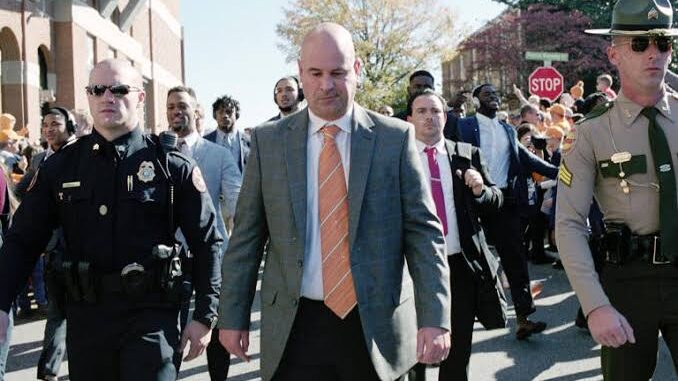
Ex-Tennessee football coach Jeremy Pruitt sues NCAA for $100 million in lost wages: report, accusing the organization of conspiring with the University of Tennessee making him possibly the “last coach in America to be punished for impermissible player benefits.”…
In a shocking legal move, former Tennessee football head coach Jeremy Pruitt has filed a lawsuit against the NCAA, claiming a loss of $100 million in wages due to what he describes as a concerted conspiracy with the University of Tennessee to punish him for impermissible player benefits. The lawsuit, which has been filed in federal court, accuses both the NCAA and the university of unfairly targeting Pruitt and damaging his reputation and career in college football.
Pruitt, who served as the head coach of the Tennessee Volunteers football team from 2018 to 2020, was fired in January 2021 amid allegations of recruiting violations, including improper benefits provided to recruits and players. The NCAA handed down severe sanctions to the university and its football program, resulting in a bowl ban, scholarship reductions, and recruiting restrictions. However, Pruitt’s lawsuit suggests that his punishment was both disproportionate and politically motivated.
At the heart of Pruitt’s lawsuit is the claim that the NCAA and the University of Tennessee colluded to target him, despite the fact that, according to Pruitt, such violations had been widespread across college football programs, with far fewer consequences for other coaches. The suit alleges that Pruitt became the “scapegoat” for a larger issue, one that the NCAA and university used to deflect blame from the broader culture of recruiting violations in the sport.
Pruitt’s legal team argues that the coach was unfairly punished in an environment where other coaches involved in similar violations were either not penalized or received far lesser sanctions. The lawsuit even goes so far as to claim that Pruitt could be the “last coach in America to be punished for impermissible player benefits,” due to the shifting attitudes toward recruiting violations in college football and a perceived lack of consistency in enforcement across the sport.
Pruitt’s suit claims that the sanctions imposed upon him by the NCAA, which led to his firing, effectively ruined his career prospects and caused him to lose significant wages. The lawsuit seeks a substantial sum of $100 million in damages, citing lost income from coaching positions that he would have secured had he not been dismissed under such circumstances. His legal team argues that the unfair treatment he received is a direct result of the NCAA’s actions, which were allegedly influenced by the University of Tennessee’s desire to absolve itself of any wrongdoing.
The coach’s accusations of collusion are not the first to surface in the world of college athletics. Pruitt’s lawsuit suggests a pattern of selective enforcement by the NCAA, with coaches at other programs seemingly escaping similar penalties for comparable violations. He and his lawyers argue that this inconsistency in punishment is indicative of an institutional failure, one that disproportionately harmed Pruitt’s career.
The timing of Pruitt’s lawsuit is particularly notable, as the NCAA is facing increasing scrutiny over its handling of rules enforcement and its treatment of coaches involved in recruiting violations. The organization has faced criticism in recent years for its inconsistent application of penalties and the perception that its enforcement efforts are often arbitrary and subjective.
As the legal battle unfolds, the NCAA and the University of Tennessee have yet to respond publicly to the lawsuit. However, the case is likely to raise significant questions about the fairness of the NCAA’s disciplinary procedures and the broader culture of college sports, where coaches often find themselves navigating a complex web of rules that can result in severe consequences for perceived infractions.
Jeremy Pruitt’s legal fight is one that could have far-reaching implications for the landscape of college football, as it highlights the tensions between enforcement, fairness, and the ever-evolving nature of recruiting regulations. While the outcome of the lawsuit remains uncertain, it is clear that Pruitt’s battle is just beginning, and it could change the way college football coaches are held accountable for violations moving forward.



Be the first to comment